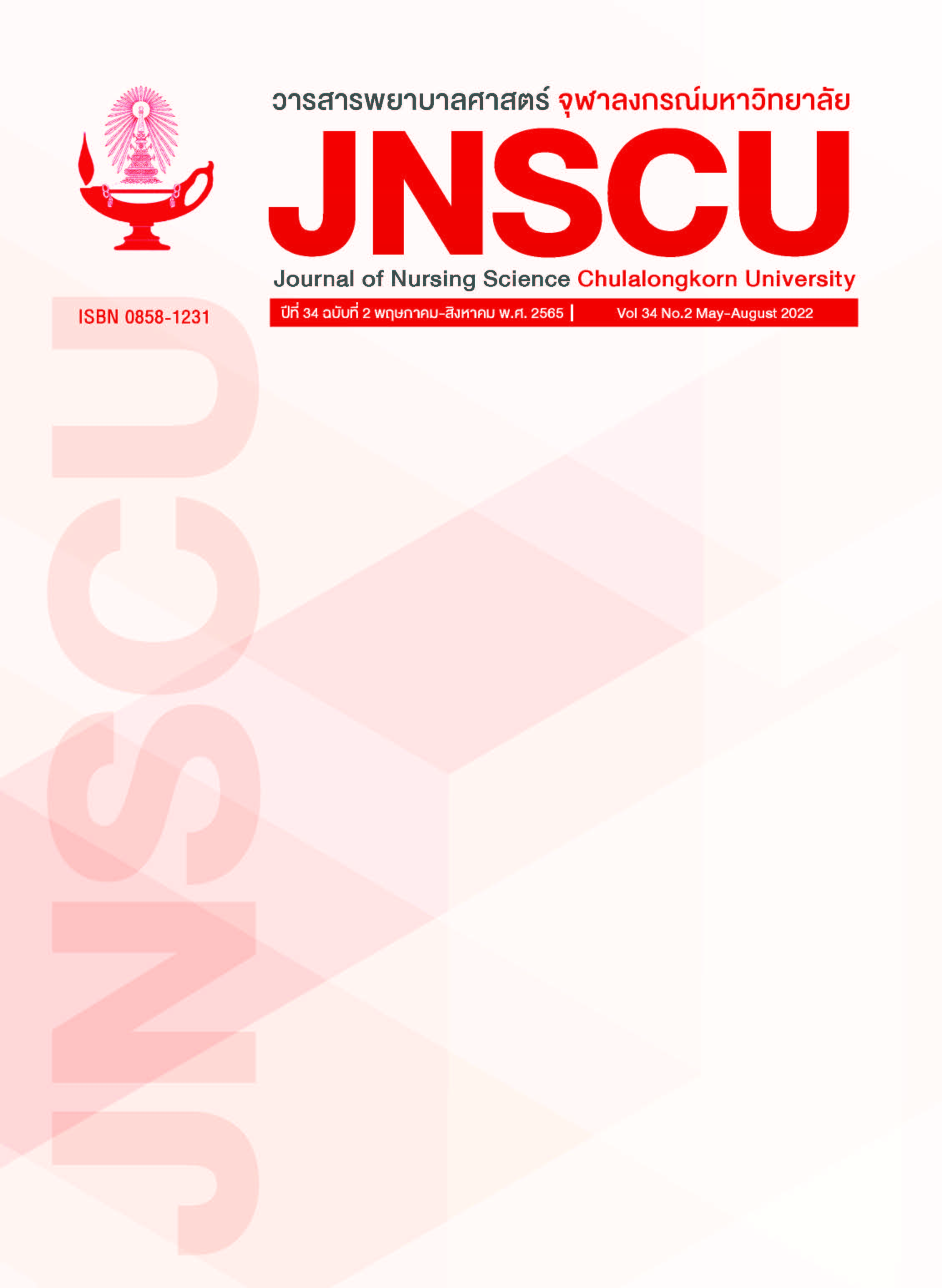ประสบการณ์การเจ็บป่วยของผู้สูงอายุที่ติดเชื้อไวรัสโคโรนา 2019
คำสำคัญ:
ประสบการณ์การเจ็บป่วย, ปรากฏการณ์วิทยา, /ผู้สูงอายุ, โรคเชื้อไวรัสโคโรนา 2019บทคัดย่อ
วัตถุประสงค์: เพื่อศึกษาประสบการณ์การเจ็บป่วยของผู้ป่วยสูงอายุที่ติดเชื้อไวรัสโคโรนา 2019
รูปแบบการวิจัย: เป็นการวิจัยเชิงคุณภาพแบบปรากฏการณ์วิทยา
วิธีการดำเนินการวิจัย: ผู้ให้ข้อมูลเป็นผู้สูงอายุที่เจ็บป่วยด้วยโรคติดเชื้อไวรัสโคโรนา 2019 ทำการเก็บข้อมูลภายหลังได้รับการรักษาและอยู่ในระยะที่ไม่สามารถแพร่กระจายเชื้อจำนวน 16 ราย เก็บรวบรวมข้อมูลโดยใช้เทคนิคการสัมภาษณ์เชิงลึก การสังเกต การบันทึกภาคสนามและการบันทึกเสียงสนทนา ข้อมูลที่ได้นำมาวิเคราะห์ข้อมูลเชิงเนื้อหาตามวิธีการของโคไลซี
ผลการวิจัย: อธิบายประสบการณ์ของการเจ็บป่วยเป็น 4 ประเด็นหลัก คือ 1) ประสบการณ์การรับรู้อาการเจ็บป่วย เริ่มแรกไม่ได้คิดว่าตนจะติดเชื้อไวรัสโคโรนา 2019 เมื่อต้องเจ็บป่วยจึงทำให้พบกับความไม่สุขสบายทั้งร่างกายและจิตใจ โดยจะมีอาการเหนื่อยมาก หายใจไม่ออก และเมื่อได้รับการรักษาแล้วพบว่าหลังจากการเจ็บป่วยร่างกายไม่เหมือนเดิม 2) ประสบการณ์ในการเข้ารับการรักษา ผู้สูงอายุรู้สึกว่าตนโชคดีที่เข้าถึงการรักษาแต่รู้สึกไม่ชินกับการรักษาที่ได้รับ ถูกจำกัดให้อยู่แต่ห้อง ทำกิจกรรมบนเตียงและได้รับการดูแลผ่านกล้องวงจรปิดและพูดคุยผ่านลำโพงจึงทำให้ขาดสัมพันธภาพกับผู้ดูแล 3) หลากอารมณ์ หลายความรู้สึกภายในใจ รู้สึกกังวล กลัวว่าจะไม่รอด เมื่อได้รักษาก็รู้สึกว้าเหว่ โดดเดี่ยว เนื่องจากต้องอยู่คนเดียวเพื่อป้องกันการแพร่เชื้อ แต่อย่างไรก็ตามการเจ็บป่วยครั้งนี้ทำให้ผู้สูงอายุรู้สึกปล่อยวาง ยอมรับและเข้าใจสภาพตามอายุที่เพิ่มขึ้น 4)ประสบการณ์ในการกลับเข้าสู่สังคม ภายหลังที่หายจากการเจ็บป่วย พบว่าถูกรังเกียจจากคนรอบข้างมีเพียงคนใกล้ตัวที่ให้กำลังใจ แต่อย่างไรก็ตามการเจ็บป่วยในสถานการณ์ที่มีการแพร่ระบาดของโรคติดเชื้อ ทำให้ผู้สูงอายุต้องปรับตนเองในการดำเนินชีวิต เพื่อป้องกันการติดเชื้อ
สรุป: ผลการวิจัยครั้งนี้ทำให้เข้าใจประสบการณ์การเจ็บป่วยของผู้ป่วยสูงอายุที่ติดเชื้อไวรัสโคโรนา 2019ซึ่งสามารถนำผลการศึกษาไปใช้เป็นแนวทางในการพัฒนาการพยาบาลแบบเป็นองค์รวมที่สามารถตอบสนองความต้องการของผู้ป่วยได้อย่างมีประสิทธิภาพ
ดาวน์โหลด
เผยแพร่แล้ว
ฉบับ
ประเภทบทความ
สัญญาอนุญาต
ลิขสิทธิ์ (c) 2023 วารสารพยาบาลศาสตร์ จุฬาลงกรณ์มหาวิทยาลัย

อนุญาตภายใต้เงื่อนไข Creative Commons Attribution-NonCommercial-NoDerivatives 4.0 International License.
##default.contextSettings.thaijo.licenseTerms##


